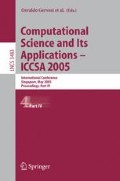Abstract
In this paper, we introduce an evaluation system for identifying program similarity by comparing syntax-trees for the given programs. By using syntax-trees, this system is capable of distinguishing plagiarism in spite of changes in program styles such as indent, white space and comments. It can also recognize plagiarism patterns resulting from changes in program structure such as statement exchanges, code block and function. Syntax-trees are created after program parsing, so they have the advantage of performing syntax and semantic analysis automatically. We also introduce an evaluation algorithm for program similarity and a grouping algorithm for the sake of reducing the count of comparisons. The experiment and estimation proves that a grouping algorithm can reduce a lot of counts of comparison.
Access this chapter
Tax calculation will be finalised at checkout
Purchases are for personal use only
Preview
Unable to display preview. Download preview PDF.
References
Joy, M., Luck, M.: Plagiarism in Programming Assignments. IEEE Transaction in Education 42, 129–133 (1999)
Cunningham, P., Mikpyan, A.N.: Using CBR Techniques to Detect Plagiarism in Programming Assignments, available at Department of Computer Science, Trinity College, Dublin (1993)
Faidhi, J.A., Robinson, S.k.: An Empirical Approach for Detecting Program Similarity within a University Programming Environment. Computers and Education 11, 11–19 (1987)
Lin, J.: JLex Tutorial, available at http://bmrc.berkeley.edu/courseware/cs164/spring98/proj/jlex/tutorial.html
Hudson, S.E.: CUP Parser Generator for Java, available at http://www.cs.princeton.edy/~appel/modern/java/CUP/
Edlun, J.R.: What is “Plagiarism” and why do people do it? University Writing Centre Director, California State University, LA (1998), available at http://www.calstatela.edu/centers/write_cn/plagiarism.htm
Johnson, J.H.: Identifying Redundancy in Source Code using Fingerprints. In: Proc. of CASCON 1993, pp. 171–183 (1993)
Howard, M., Halstead: Elements of Software Science. Elsevier, Amsterdam (1977)
Ottenstein, K.J.: An Algorithmic Approach to the Detection and Prevention of Plagiarism. ACM SIGSCE Bulletin 8, 30–41 (1976)
Donaldson, J.L., Lancaster, A.M.: A Plagiarism Detection System. In: ASM SIGSCE Bulletin (Proc. of 12th SIGSCE Technical Symp.), vol. 13, pp. 21–25 (1981)
Berghel, H.L., Sallach, D.L.: Measurements of Program Similarity in Identical Task Environments. ACM SIGPLAN Notices 19, 65–76 (1984)
Wise, M.J.: Detection of Similarities in Student Programs: YAP’ing may be Preferable to Plague’ing. In: ACM SIGSCE Bulletin (Proc. of 23rd SIGCSE Technical Symp.), vol. 24, pp. 268–271 (1992)
Aiken, A.: MOSS (Measure of Software Similarity) Plagiarism detection system, University of Berkeley, CA (2000), available at http://www.cs.berkeley.edu/~moss/
Prechelt, L., Malpohl, G., Philppsen, M.: JPlag: Finding Plagiarism Among a Set of Programs D-76128 Karlsruhe, Germany, Technical Report 2000-1 (2000), available at http://wwwipd.ira.uka.de/EIR/
Gitchell, D., Tran, N.: Sim: A Utility For Detecting Similarity in Computer Programs. In: Proc. of 30th SCGCSE Technical Symp., New Orleans, USA, pp. 266–270 (1998), available at ftp://ftp.cs.vu.nl/pub/dick/similarity_tester/
Chen, X., Li, M., Mckinnon, B., Seker, A.: A Theory of Uncheatable Program Plagiarism Detection and Its Practical Implementation. University of California, Santa Barbara (2002)
Chen, X., Kwong, S., Li, M.: A Compression Algorithm for DNA Sequence and its Applications in Genome Comparison. In: Proc. of the 20th Workshop on Genome Information, pp. 52–61 (1999)
Baxter, I.D., Yahin, A., Moura, L., Sant’Anna, M., Bier, L.: Clone Detection using Abstract Syntax Trees. In: Proc. of the International Conference on Software Maintenance, Bethesda, Maryland, pp. 368–378 (1998)
Author information
Authors and Affiliations
Editor information
Editors and Affiliations
Rights and permissions
Copyright information
© 2005 Springer-Verlag Berlin Heidelberg
About this paper
Cite this paper
Kim, YC., Choi, J. (2005). A Program Plagiarism Evaluation System. In: Gervasi, O., et al. Computational Science and Its Applications – ICCSA 2005. ICCSA 2005. Lecture Notes in Computer Science, vol 3483. Springer, Berlin, Heidelberg. https://doi.org/10.1007/11424925_2
Download citation
DOI: https://doi.org/10.1007/11424925_2
Publisher Name: Springer, Berlin, Heidelberg
Print ISBN: 978-3-540-25863-6
Online ISBN: 978-3-540-32309-9
eBook Packages: Computer ScienceComputer Science (R0)

